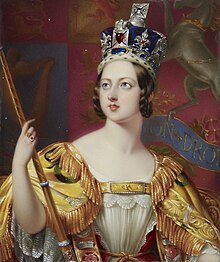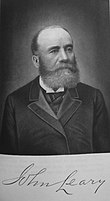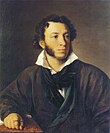| Revision as of 18:04, 18 December 2020 editMonkbot (talk | contribs)Bots3,695,952 editsm Task 18 (cosmetic): eval 6 templates: hyphenate params (5×); del |url-status= (1×);Tag: AWB← Previous edit | Revision as of 01:04, 20 December 2020 edit undoDimadick (talk | contribs)Autopatrolled, Extended confirmed users, Pending changes reviewers804,842 edits →July–DecemberNext edit → | ||
| Line 166: | Line 166: | ||
| * ] – ], Austrian composer (b. ]) | * ] – ], Austrian composer (b. ]) | ||
| * ] – ], American abolitionist (b. ]) | * ] – ], American abolitionist (b. ]) | ||
| * ] - Sophie Botta, the ], German woman of mysterious identity | |||
| === Date Unknown === | === Date Unknown === | ||
Revision as of 01:04, 20 December 2020
Calendar year
| Millennium: | 2nd millennium |
|---|---|
| Centuries: | |
| Decades: | |
| Years: |
| 1837 by topic |
|---|
| Humanities |
| By country |
| Other topics |
| Lists of leaders |
| Birth and death categories |
| Establishments and disestablishments categories |
| Works category |
| Gregorian calendar | 1837 MDCCCXXXVII |
| Ab urbe condita | 2590 |
| Armenian calendar | 1286 ԹՎ ՌՄՁԶ |
| Assyrian calendar | 6587 |
| Balinese saka calendar | 1758–1759 |
| Bengali calendar | 1243–1244 |
| Berber calendar | 2787 |
| British Regnal year | 7 Will. 4 – 1 Vict. 1 |
| Buddhist calendar | 2381 |
| Burmese calendar | 1199 |
| Byzantine calendar | 7345–7346 |
| Chinese calendar | 丙申年 (Fire Monkey) 4534 or 4327 — to — 丁酉年 (Fire Rooster) 4535 or 4328 |
| Coptic calendar | 1553–1554 |
| Discordian calendar | 3003 |
| Ethiopian calendar | 1829–1830 |
| Hebrew calendar | 5597–5598 |
| Hindu calendars | |
| - Vikram Samvat | 1893–1894 |
| - Shaka Samvat | 1758–1759 |
| - Kali Yuga | 4937–4938 |
| Holocene calendar | 11837 |
| Igbo calendar | 837–838 |
| Iranian calendar | 1215–1216 |
| Islamic calendar | 1252–1253 |
| Japanese calendar | Tenpō 8 (天保8年) |
| Javanese calendar | 1764–1765 |
| Julian calendar | Gregorian minus 12 days |
| Korean calendar | 4170 |
| Minguo calendar | 75 before ROC 民前75年 |
| Nanakshahi calendar | 369 |
| Thai solar calendar | 2379–2380 |
| Tibetan calendar | 阳火猴年 (male Fire-Monkey) 1963 or 1582 or 810 — to — 阴火鸡年 (female Fire-Rooster) 1964 or 1583 or 811 |

1837 (MDCCCXXXVII) was a common year starting on Sunday of the Gregorian calendar and a common year starting on Friday of the Julian calendar, the 1837th year of the Common Era (CE) and Anno Domini (AD) designations, the 837th year of the 2nd millennium, the 37th year of the 19th century, and the 8th year of the 1830s decade. As of the start of 1837, the Gregorian calendar was 12 days ahead of the Julian calendar, which remained in localized use until 1923.
Calendar yearEvents
January–March
- January 1 – The destructive Galilee earthquake causes 6,000–7,000 casualties in Ottoman Syria.
- January 26 – Michigan becomes the 26th state admitted to the United States.
- February – Charles Dickens's Oliver Twist begins publication in serial form in London.
- February 4 – Seminoles attack Fort Foster in Florida.
- February 25 – In Philadelphia, the Institute for Colored Youth (ICY) is founded, as the first institution for the higher education of black people in the United States.
- March 1 – The Congregation of Holy Cross is formed in Le Mans, France, by the signing of the Fundamental Act of Union, which legally joins the Auxiliary Priests of Blessed Basil Moreau, CSC, and the Brothers of St. Joseph (founded by Jacques-François Dujarié) into one religious association.
- March 4
- Martin Van Buren is sworn in as the eighth President of the United States.
- The city of Chicago is incorporated.
April–June
- April 12 – The conglomerate of Procter & Gamble has its origins, when British-born businessmen William Procter and James Gamble begin selling their first manufactured goods (soap and candles) in Cincinnati, Ohio.
- April 24–26 – The great fire in Surat city of India caused more than 500 deaths and destruction of more than 9000 houses.
- May – W. F. Cooke and Charles Wheatstone patent a system of electrical telegraph.
- May 10 – The Panic of 1837 begins in New York City.
- June 5 – The settlement of Houston is incorporated, by the Republic of Texas.
- June 11 – The Broad Street Riot occurs in Boston, Massachusetts, fueled by ethnic tensions between the Irish and the Yankees.
- June 20 – Queen Victoria, 18, accedes to the throne of the United Kingdom, on the death of her uncle William IV without legitimate heirs (she will reign for more than 63 years). Under Salic law, the Kingdom of Hanover passes to William's brother, Ernest Augustus, Duke of Cumberland, ending the personal union of Britain and Hanover which has persisted since 1714.
July–September
- July – Charles W. King sets sail on the American merchant ship Morrison. In the Morrison incident, he is turned away from Japanese ports with cannon fire.
- July 13 – Queen Victoria moves from Kensington Palace into Buckingham Palace, the first reigning British monarch to make this, rather than St James's Palace, her London home.
- August 16 – The Dutch sack the fortress of Bonjol, Indonesia, ending the Padri War.
- September 19 – First Carlist War – Battle of Aranzueque: The liberal forces loyal to Queen Isabel II of Spain are victorious, ending the Carlist campaign known as the Expedición Real.
- September 28 – Samuel Morse files a caveat for a patent for the telegraph.
October–December
- October 10–13 – The French army besieges and captures Constantine in French Algeria.
- October 31 – World's leading consumer goods brand, Procter & Gamble was founded in Ohio, United States.
- November 7 – American abolitionist and newspaper editor Elijah Lovejoy is killed by a pro-slavery mob, at his warehouse in Alton, Illinois.
- November 8 – Mount Holyoke Female Seminary, later Mount Holyoke College, is founded in South Hadley, Massachusetts.
- November 17 – An earthquake in Valdivia, south-central Chile, causes tsunamies that led to significant destruction along Japan's coast.
- November–December – In the Canadas, William Lyon Mackenzie leads the Upper Canada Rebellion, and Louis-Joseph Papineau leads the Lower Canada Rebellion.
- December 17 – Fire breaks out in the Winter Palace, in Saint Petersburg, Russia killing 30 guards
- December 29 – The Caroline Affair, on the Niagara River, becomes the basis for the Caroline test for anticipatory self-defence in international relations.
Date unknown

- Sylvain Charles Valée and French troops capture Skikda, Algeria.
- Louis Daguerre develops the daguerreotype.
- The 5th century B.C. Berlin Foundry Cup is acquired, for the Antikensammlung Berlin in Germany.
- The Olney Friends School is founded in the Appalachian Mountains.
- The first electric locomotive built was a battery locomotive. It was built by chemist Robert Davidson of Aberdeen in Scotland, and it was powered by galvanic cells (batteries).
Births
January–June

- January 2 – Mily Balakirev, Russian composer (d. 1910)
- January 7 – Thomas Henry Ismay, English shipowner (White Star Line) (d. 1899)
- February 5
- Dwight L. Moody, American evangelist (d. 1899)
- Edward Miner Gallaudet, American educator of the deaf (d. 1917)
- February 13 – Valentin Zubiaurre, Spanish composer (d. 1914)
- February 20 – Samuel Swett Green, American librarian, advocate (d. 1918)
- March 1 – William Dean Howells, American writer, historian, editor, and politician (d. 1920)
- March 3 – Jacques Duchesne, French general (d. 1918)
- March 7 – Henry Draper, American physician and astronomer (d. 1882)
- March 18 – Grover Cleveland, 22nd and 24th President of the United States (d. 1908)
- March 22 – Virginia Oldoini, Countess of Castiglione (d. 1899)
- March 23 – Sir Charles Wyndham, English actor, theatrical manager (d. 1919)
- March 27 – Kate Fox, American medium (d. 1892)
- April 5 – Algernon Charles Swinburne, English poet (d. 1909)
- April 17 – J. P. Morgan, American financier, banker (d. 1913)
- April 21 – Fredrik Bajer, Danish politician, pacifist, recipient of the Nobel Peace Prize (d. 1922)
- April 27 – Queen Cheorin, Korean queen (d. 1878)
- April 29 – Georges Ernest Boulanger, French general, politician (d. 1891)
- May 5
- Anna Maria Mozzoni, Italian feminist, founder of the Italian women's movement (d. 1920)
- Theodor Rosetti, 16th Prime Minister of Romania (d. 1923)
- May 7 – Karl Mauch, German explorer (d. 1875)
- May 9
- May 27 – Wild Bill Hickok, American gunfighter (d. 1876)
- May 28
- George Ashlin, Irish architect (d. 1921)
- Tony Pastor, American impresario, theater owner (d. 1908)
- June 7 – Alois Hitler, Austrian civil servant (d. 1903)
- June 20 – David Josiah Brewer, Associate Justice of the Supreme Court of the United States (d. 1910)
- June 22
- Paul Bachmann, German mathematician (d. 1920)
- Paul Morphy, American chess player (d. 1884)
- Touch the Clouds, Native American Miniconjou chief (d. 1905)
- June 28 – Petre P. Carp, 2-time Prime Minister of Romania (d. 1919)
July–December



- July 4 – Carolus-Duran, French painter (d. 1917)
- July 18 – Vasil Levski, Bulgarian revolutionary (d. 1873)
- July 21 – Johanna Hedén, Swedish midwife, surgeon (d. 1912)
- August 1 – (bapt.) Mary Harris Jones ("Mother Jones"), Irish-American labor leader (d. 1930)
- August 5 – Anna Filosofova, Russian women's rights activist (d. 1912)
- August 24 – Théodore Dubois, French composer (d. 1924)
- September 2 – James H. Wilson, Union Army major general in the American Civil War (d. 1925)
- September 12 – Louis IV, Grand Duke of Hesse (d. 1892)
- September 14 – Nikolai Bugaev, Russian mathematician (d.1903)
- September 16 – King Pedro V of Portugal (d. 1861)
- September 18 – Aires de Ornelas e Vasconcelos, Portuguese Archbishop of Goa (d. 1880)
- September 24 – Mark Hanna, United States Senator from Ohio (d. 1904)
- October 3 – Nicolás Avellaneda, Argentine president (d. 1885)
- October 4 – Auguste-Réal Angers, Canadian judge and politician, 6th Lieutenant Governor of Quebec (d. 1919)
- October 5 – José Plácido Caamaño, 12th President of Ecuador (d. 1900)
- October 10 – Robert Gould Shaw, Union Army general in the American Civil War, social reformer (k. 1863)
- October 26 – Carl Koldewey, German explorer famous for the German North Polar Expedition (d. 1908)
- October 28 – Tokugawa Yoshinobu, Japanese shōgun, 15th and last of the Tokugawa shogunate (d. 1913)
- October 29 – Harriet Powers, African-American folk artist (d. 1910)
- November 2 – Émile Bayard, French artist, illustrator (d. 1891)
- November 5 – Arnold Janssen, German-born Catholic priest, saint (d. 1909)
- November 20 – Lewis Waterman, American inventor, businessman (d.1901)
- November 23 – Johannes Diderik van der Waals, Dutch physicist, Nobel Prize laureate (d. 1923)
- December (unknown date) – Bella French Swisher, American writer (d. 1893)
- December 9 – Kabayama Sukenori, Japanese samurai, general, and statesman (d. 1922)
- December 11 – Webster Paulson, English civil engineer (d. 1887)
- December 15 – George B. Post, American architect (d. 1913)
- December 24
- Empress Elisabeth of Austria, wife of Emperor Franz Joseph I (d. 1898)
- Cosima Wagner, wife of German composer Richard Wagner (d. 1930)
- December 26
- Sir William Dawkins, British geologist (d. 1929)
- George Dewey, American admiral (d. 1917)
Deaths
January–June


- January 8 – Duke Wilhelm in Bavaria, Great-grandfather of Empress Elisabeth of Austria (b. 1752)
- January 20 – John Soane, British architect (b. 1753)
- January 23 – John Field, Irish composer (b. 1782)
- February 7 – Gustav IV Adolf, ex-King of Sweden (b. 1778)
- February 10 – Alexander Pushkin, Russian author (b. 1799)
- February 13 – Mariano José de Larra, Spanish author (b. 1809)
- February 19 – Georg Büchner, German playwright (b. 1813)
- March 31 – John Constable, English painter (b. 1776)
- April 4 – Louis-Sébastien Lenormand, French chemist, physicist, and inventor (b. 1757)
- April 28 – Joseph Souham, French general (b. 1760)
- May 5 – Niccolò Antonio Zingarelli, Italian composer (b. 1752)
- May 9 – Osgood Johnson, 5th Principal of Phillips Academy (b. 1803)
- May 20 – Prince Frederick of Hesse-Kassel (b. 1747)
- June 14 – Giacomo Leopardi, Italian writer (b. 1798)
- June 29 – Nathaniel Macon, American politician (b. 1757)
- June 20 – King William IV of the United Kingdom and Hannover (b. 1765)
July–December
- July 18 – Vincenzo Borg, Maltese merchant, rebel leader (b. 1777)
- August 12 – Pierre Laromiguière, French philosopher (b. 1756)
- September 7 – Fabian Gottlieb von Osten-Sacken, Russian military leader (b. 1752)
- September 21 – Pieter Vreede, Dutch politician (b. 1750)
- September 28 – Akbar II, last Mughal emperor of India (b. 1760)
- October 1 – Robert Clark, American politician (b. 1777)
- October 10 – Charles Fourier, French philosopher (b. 1772)
- October 12 – Charles-Marie Denys de Damrémont, French governor-general of French Algeria (killed during the siege of Constantine) (b. 1783)
- October 17 – Johann Nepomuk Hummel, Austrian composer (b. 1778)
- November 7 – Elijah P. Lovejoy, American abolitionist (b. 1802)
- November 28 - Sophie Botta, the Dark Countess, German woman of mysterious identity
Date Unknown
- Mary Dixon Kies, first American recipient of a U.S. patent (b. 1752)
- Anne Pépin, Senegalese Signara (b. 1747)
References
- Procter & Gamble history
- "Icons, a portrait of England 1820–1840". Archived from the original on September 22, 2007. Retrieved September 12, 2007.
- Penguin Pocket On This Day. Penguin Reference Library. 2006. ISBN 0-14-102715-0.
- Morse Timeline on memory.loc.gov (accessed on May 27, 2014)
- "A Company History1837 - Today" (PDF). Retrieved July 21, 2020.
- Cisternas, M.; Carvajal, M.; Wesson, R.; Ely, L.L.; Gorigoitia, N. (2018). "Exploring the Historical Earthquakes Preceding the Giant 1960 Chile Earthquake in a Time-Dependent Seismogenic Zone". Bulletin of the Seismological Society of America. 107 (6): 2664–2675. doi:10.1785/0120170103.
- "Philippeville, Algeria". World Digital Library. 1899. Retrieved September 26, 2013.
Further reading
- "Chronicle of Events from August 1836 to September 1837". American Almanac and Repository of Useful Knowledge. Boston: Charles Bowen. 1838.